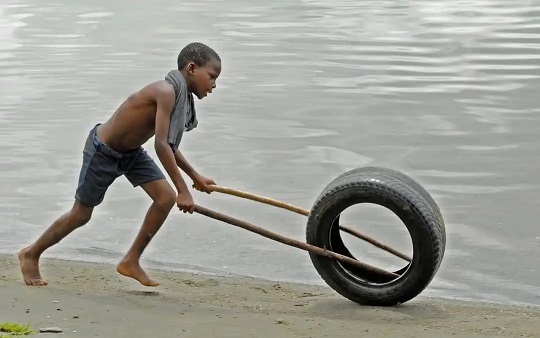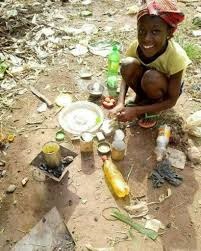![]()
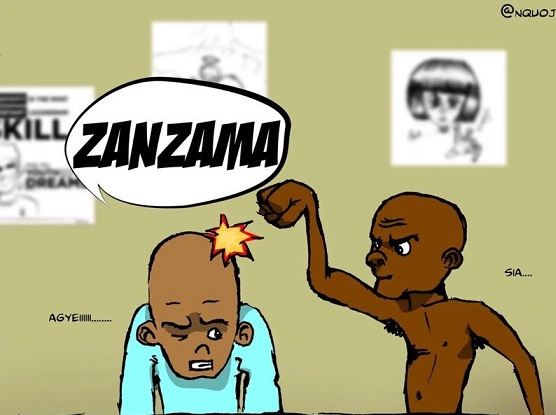
Here are some classic local games from back in the day
We are in the month of March and Ghana is still celebrating Heritage Month also known as Ghana Month.
Graphic Showbiz is taking a delightful trip down memory lane to revisit cherished local games that made our yesteryears so terrific. Who can forget the intense battles of Zanzama, the rolling of tyres, or the strategic manoeuvres of Tumantu(hopscotch)?
These games, along with Chaskele, Parachute, Pampanaa, Oware, Kotonkro, Counters Ball, Alokoto, Kpitinge, Ludo, Police and Thieves, Pilolo, Antoekyire, and Ampe, were not just activities; they were the essence of our cultural fabric, binding communities and generations together.
Here is a carefully curated list of some of our beloved local games of yesteryears. Do you have a favourite?
Advertisement
Zanzama
This is a very cruel but interesting game. Players are required to say the word, “Zanzama” before sitting down. If Player A sits without saying “zanzama”, Player B is entitled to give Player A a knock on the head for not saying the word.
Alokoto
Alikoto is a game played by children in Ghana.
Alikoto requires the cover of a pen and the cover of size D batteries. By combining these two, you can create a simple toy that can be spun (called “alikoto”).
The idea is that players spin the “alikoto” and try to turn it flat in its head by hitting its bottom with the side of their palm.
Whoever fails to turn the “alikoto” on its head will be hit with it on the hand by the other player(s) who successfully managed to do it.

Ampe
Ampe is a traditional outdoor game played by two or more people (usually only girls). It involves rhythmic clapping, jumping, and quick reflexes.
Players take turns performing specific movements and clapping patterns while jumping over lines drawn on the ground.
This game originated in Ghana but is now also played in other African countries

Antoakyire
Antoakyire is a communal game usually played by young people to while away time.
Up to about twenty players can take part. The larger the number, the more interesting it is.
The players stand in a circle and each with a piece of cloth tied in a form of a knot at one end. Before the game starts, a place or object of refuge is chosen and a defaulter is free from beating as soon as he or she runs to the place or object of refuge .
The rule of the game is that for those children sitting, nobody is to look back. One player holding a piece of cloth begins to run behind the others who are in a circle.
He or she leads them in a song and they all join in. In the process, the moderator or the one whose turn is to run around secretly and quietly dumps the cloth behind one of those seated and continues to sing as if nothing had happened.
This player leaves his or her place and follows the first who comes to take the place of the second.
Antoakyire therefore is game that makes one vigilant, thus quick to notice any unusual and potentially dangerous or difficult circumstances around him or her.

Chaskele
Chaskele is a local bat-and-ball game played between two teams of two players.It is a Ghanaian game played by children and it is similar to cricket.
The ball is made with a crushed tin can and a stick is used as a bat.
Chaskele is played with crushed cans, stick, car tyre or bucket. A minimum of two players can start the game, one begins as the defender and the other, the scorer.
The defender is to make sure the opponent does not throw the ball into the bucket or car tyre to win.
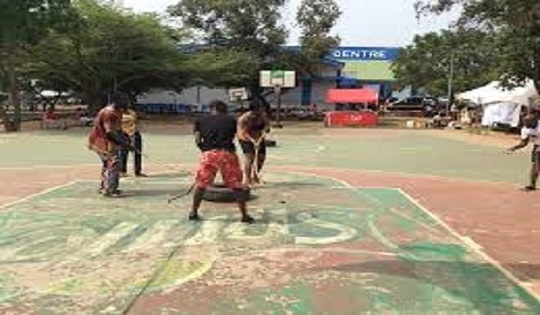
Counters
Counters Ball is a replica of a football game, with the only difference that instead of using a Playstation to play, you use bottle tops (used as footballers), any small round object (used as the ball) and recreate some goal posts. Players take turns in hitting their counters to get the ball into the opponent’s goal post.
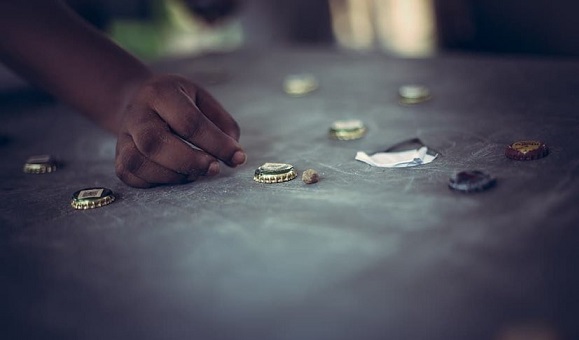
Kpitinge
A heap of sand and a pointed object is required to play this game.
The aim is for players to get the pointed object to stick into the sand from various positions. A player who fails to get the pointed object to stick into the sand will be hit on the hand with the object by the other players who successfully did.
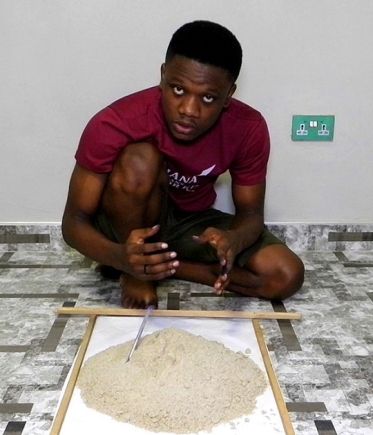
Ludo
Ludo is a strategy board game for two to four players, in which the players race their four tokens from start to finish according to the rolls of a single die.
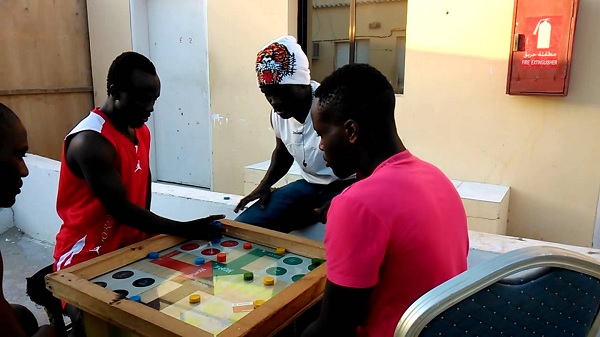
Pampanaa
This was an exciting game that involved the use of sticks that look like guns to shoot opponents. Players are given time to hide at a place where they can’t be caught. It’s based on being smart and making sure you are not caught and shot by your opponents.
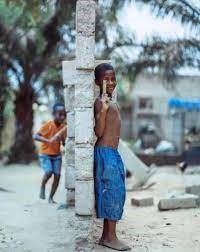
Oware
Oware is an abstract strategy game with two straight rows of six pits, called "houses". Each player controls the six houses on their side of the board. The game starts with four seeds in each house. The object of the game is to capture more seeds than your opponent.
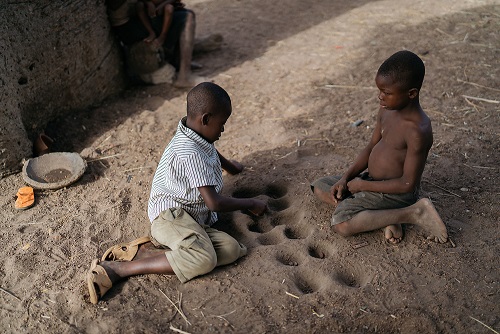
Pilolo
The players gather at a start/finish line. The leader then yells, 'Pilolo! ' and the players run to find a hidden object and get back to the finish line first. The person who crosses the line first wins.
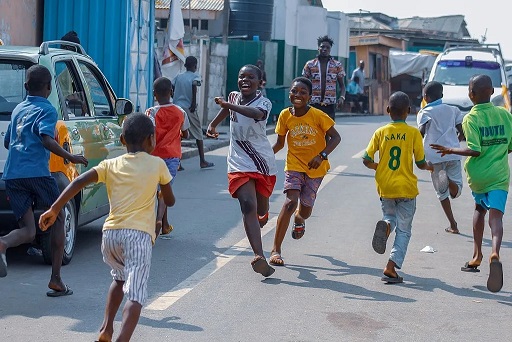
Cloths Parachutes
This game is played by tying the ends of an African cloth around your waist and holding the other ends above your head.
Feeling the wind beneath the Parachutes we made from our mothers’ traditional clothes as we ran was definitely one of the highlights of our days.
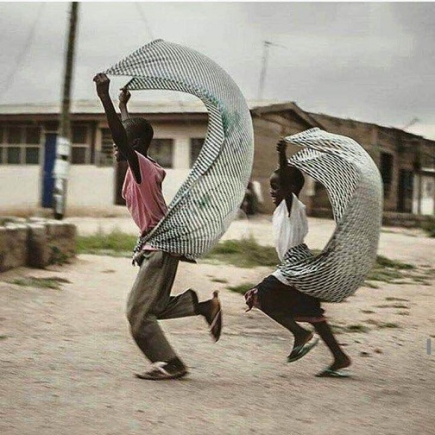
Tumatu
This game is regarded as the Ghanaian version of hopscotch. It requires players to jump a lot.
Basically, you need to put your opponent in a position that forces them to make and hopefully fail at near-impossible jumps by, more or less, buying spaces on a drawn-out grid.
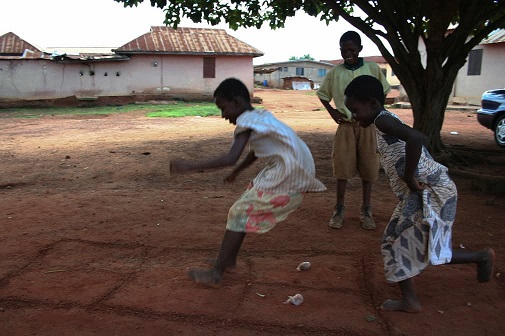
Tyree
